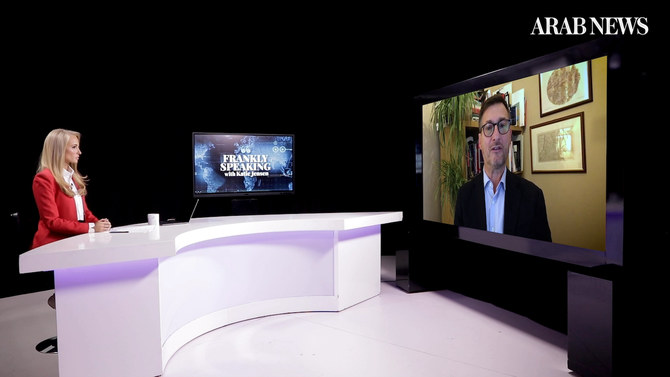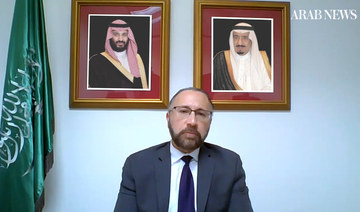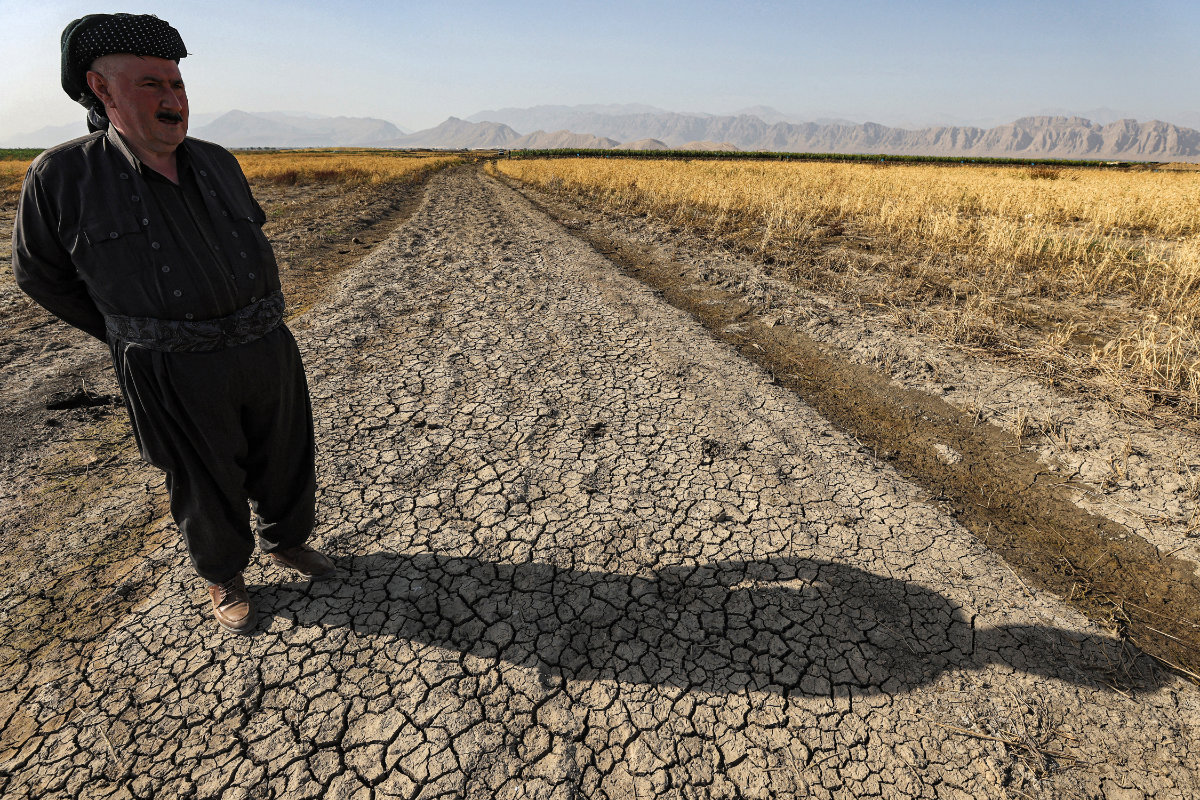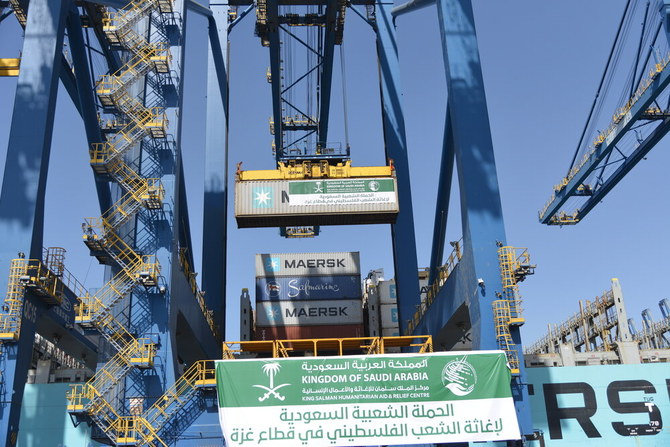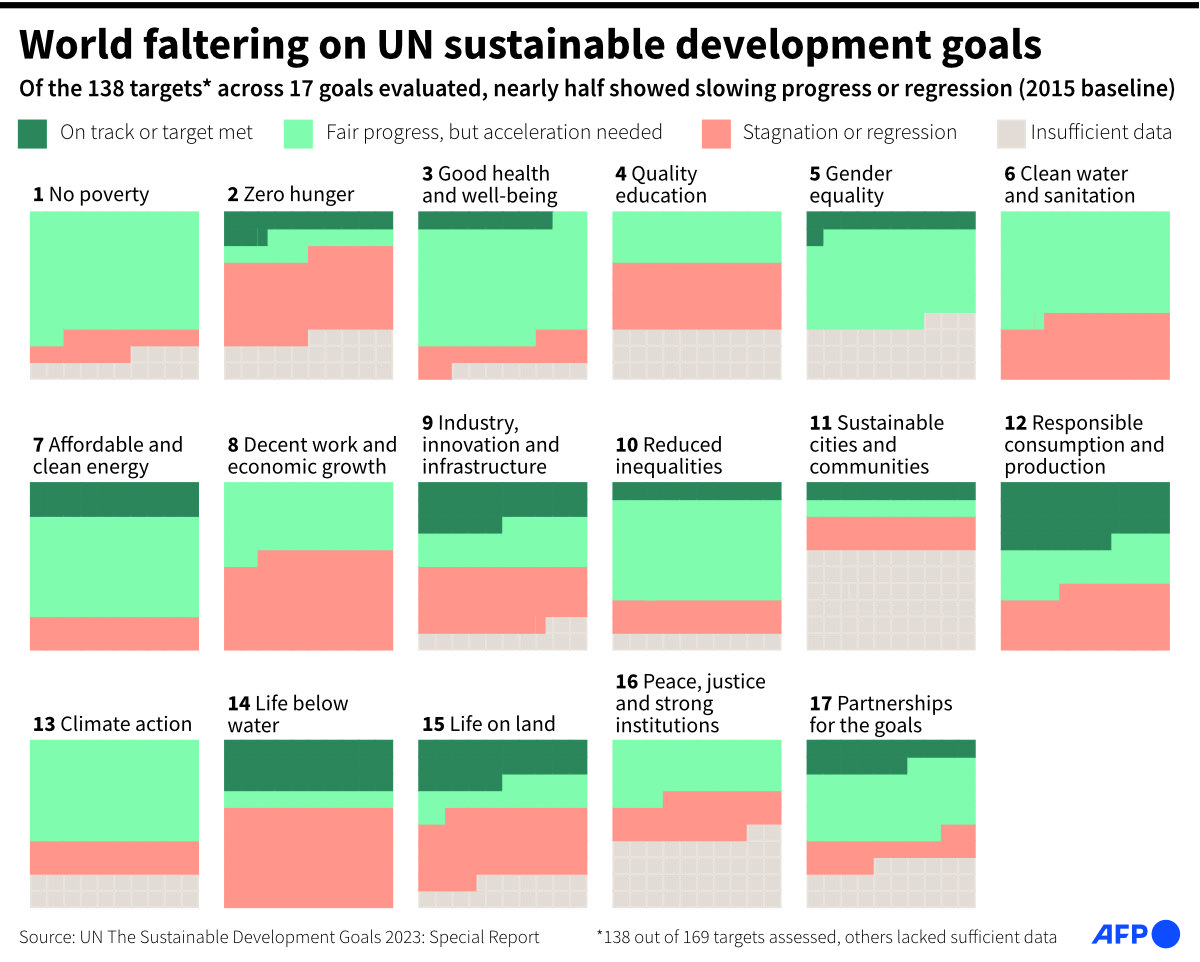DUBAI: Israel has to meet the conditions set out in the Arab Peace Initiative proposed by Riyadh in 2002 for any dreams of normalization of ties with Saudi Arabia to materialize, Yossi Mekelberg, associate fellow for the Middle East and North Africa Program at Chatham House, has said.
Appearing in the latest episode of “Frankly Speaking,” the weekly Arab News current affairs show, Mekelberg said that the Arab Peace Initiative is “as relevant today as it was 21 years ago” as a means of ending the conflict and achieving normalization.

Professor Yossi Mekelberg appears on the Frankly Speaking show hosted by Katie Jensen. (AN photo)
In a recent column for The New York Times, Thomas Friedman reckoned that a Saudi-Israeli normalization deal would force the ultra-rightwing elements in the cabinet of Israeli Prime Minister Benjamin Netanyahu to choose between annexing further Palestinian territory and accepting peace with the Arab and Islamic worlds.
The Pulitzer Prize-winning journalist should know the significance of this potential development: it was he who revealed details of King Abdullah’s initiative in a famous column back in 2002.
The Arab Peace Initiative, proposed by Saudi Arabia’s late King Abdullah in 2002, was endorsed by the Arab League the same year at the Beirut Summit. It was re-endorsed at the 2007 and at the 2017 Arab League summits.
It offered normalization of Arab-Israeli relations in return for a full withdrawal by Israel from the occupied Arab territories, a “just settlement” of the Palestinian refugee problem, and the establishment of a Palestinian state with East Jerusalem as its capital.
“I think it’s actually Saudi Arabia at the time that set the right tone for normalization with Israel — that it is something that is desirable, it’s something that is possible,” Mekelberg said.
“But at the same time, there is one condition, and the condition is that Israel and the Palestinians resolve all their outstanding issues.
“Just to remind the viewers that this was in 2002, it was at the height of the second intifada, when this (breakthrough) didn’t look possible. But it could have been a real breakthrough given the right approach by Riyadh.
“Israel actually rejected the offer that was translated into the whole declaration. I think this is as relevant today as it was relevant 21 years ago. And possibly that should be the direction.”
Saudi Arabia and several other states still want to see the Arab Peace Initiative implemented before they agree to consider formal normalization with Israel.
According to Friedman, any US-brokered deal that seeks to normalize relations between Saudi Arabia and Israel would require Washington to give Riyadh certain security guarantees as well. He said that the deal could fail to materialize if Democrats in the US Senate were put off by the anti-democratic turn taking place in Israel.
He urged US President Joe Biden and his administration to lean on their Israeli counterparts to rein in the government’s extreme agenda and its attempts to dismantle the Oslo peace process and the road map for a two-state solution.

US President Joe Biden meets with Israeli President Isaac Herzog in the Oval Office at the White House in Washington, DC. (File/AFP)
“If I am interpreting what Friedman is saying, that it’s possible to change the mind of the very right wing, the Zionist religion party, people like Itamar Ben-Gvir and Bezalel Smotrich, and their supporters, that they will exchange the concessions that need to be made for peace, for this kind of normalization and acceptance in the region. If he is right and this is possible, why not? But I can’t see this happening,” Mekelberg said.
With the threat of a corruption trial looming, Mekelberg said, “Netanyahu can’t afford the government to fall … his main concern is to find a way to derail this corruption trial and prevent potentially going to jail.”
The US has been pushing for a Saudi-Israeli peace deal since President Biden’s visit to the Kingdom last year. Other high-level visits from National Security Adviser Jake Sullivan and Secretary of State Antony Blinken this year have also focused on normalization efforts.
But while Blinken told the AIPAC Conference in Washington in June that any normalization “should advance the well-being of the Palestinian people,” it is unclear whether the US will push for a freeze on settlements or a promise never to annex the West Bank.
Reports from Axios suggest that the White House wants an agreement between Saudi Arabia and Israel before the end of the year to give the Biden administration a major boost on the campaign trail ahead of the 2024 elections.

US Secretary of State Antony Blinken delivers remarks at the American Israel Public Affairs Committee (AIPAC) policy Summit in Washington. (File/Reuters)
Mekelberg said that “in principle, Washington can have great influence on Israel because of the close relationship alliance between the two countries,” but said he did not expect Biden to use this “influence or power … during (an) election year.”
Ultimately, Mekelberg argued, normalization would only be successful if Netanyahu and his government decide that the corruption trial “is secondary to normalization with Saudi Arabia” and that it is “important for the future in Israel. This is ensuring Israel’s security and prosperity in the long run.”
However, he added it would require Israeli political parties to “climb down from a very, very tall tree,” which would be challenging.
Mekelberg said that while any normalization “is a cause of celebration,” efforts by other countries in the region to improve diplomatic relations with Israel in the past have not yielded the desired results.

Israeli PM Benjamin Netanyahu and the foreign ministers of Bahrain and the UAE sign historic accords normalizing ties between the Jewish and Arab states at the White House. (File/AFP)
He called the Abraham Accords in 2020 between Israel and countries including the UAE, Bahrain, Sudan and Morocco a “positive development,” but added: “It (still) left you with the Palestinian issue. And this was the elephant in the room and remains the elephant in the room.”
Mekelberg believes that Israel has used the Abraham Accords to “feel more secure” and “to take even more risk” against the Palestinians. He said the underlying feeling in Israel’s government was that “the whole world doesn’t care about the Palestinians anymore. We can get normalization for free.”
The prospect of normalization between Saudi Arabia and Israel has stirred both anticipation and skepticism in recent weeks. Mekelberg believes that while diplomatic strides have been made, the road to full normalization remains rife with challenges.
While Netanyahu has long claimed normalization is a top priority for his government and one that could lead to the end of the Middle East conflict, Mekelberg raised concerns that Netanyahu is a “weak leader, held hostage” by his ultra-rightwing government.

Israel’s Prime Minister Benjamin Netanyahu speaks during the weekly cabinet meeting in the prime minister’s office in Jerusalem. (File/AFP)
Saudi Arabia has consistently said that the success of a Saudi-Israeli normalization hinges on Israeli addressing the plight of the Palestinian people and creating a just solution they will accept.
Saudi Crown Prince Mohammed bin Salman underscored this position in May at the Arab League Summit in Jeddah, saying that the “Palestinian issue was and remains the central issue for Arab countries, and it is at the top of the Kingdom’s priorities.”
But while Saudi Arabia continues to push for Palestinian statehood and, ultimately, peace in the Middle East, Mekelberg appears skeptical of Netanyahu’s priorities.
He said that Netanyahu is “dreaming in public about having trains going all the way to Jeddah and Riyadh, but he forgets that it comes with certain things, certain concessions that he has to make until this becomes a reality.”
While normalization between historic adversaries “is possible,” he sees no evidence that Israel’s ultra-rightwing government will make the concessions needed for the Palestinians that will satisfy the Kingdom.
Mekelberg added that “Israel is in a huge crisis,” destabilized by the weekly protests and judicial reforms that critics say threaten the country’s democracy.
Because of Netanyahu’s new judicial reforms, “hundreds of thousands of people are in the streets, and (at) the same time, settlements are expanding. This is the most ultra-right government in Israel. So, normalization, yes, but probably not now.”

The host of Frankly Speaking Katie Jensen. (AN photo)
There are major concerns about the new political reforms that the Knesset has passed recently, namely legislation abolishing the “reasonable doctrine.”
Until now, Israel’s Supreme Court has been able to intervene when it feels the government is acting recklessly. But last month, all 64 government members voted to abolish the law. It means Israel’s government can override any Supreme Court decisions with a small majority.
The controversial reforms have divided the country, with weekly mass demonstrations and clashes with police since the start of the year. Hundreds of thousands of people have taken part, with huge numbers arrested.
Mekelberg describes the judicial reforms as a “real danger” to Israel and accuses the current government of charting a path away from democracy.
Netanyahu, he added, is now stuck in a political quagmire where he wants to “leave a legacy ... of peace ... with (the) normalization of Saudi Arabia (and Israel) and complete the Abraham Accords” while trying to appease his ultra-rightwing government, which is pushing for even harsher changes to the constitution.



